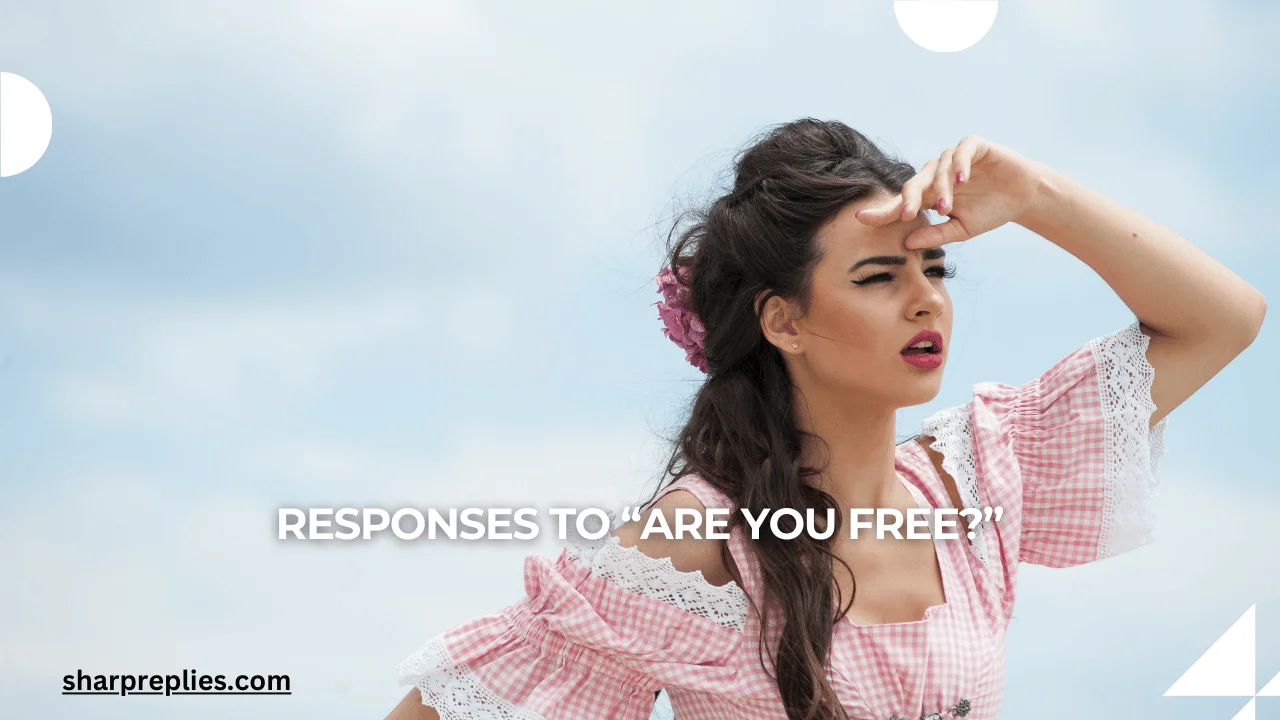Have you ever received the simple question, “Are you free?”, only to be unsure of how to respond? In today’s fast-paced world, the phrase holds more weight than it may first appear.
It’s a question that can lead to anything from casual plans with friends to work-related requests that demand your immediate attention. The way you respond to this question can set the tone for an interaction, showcase your boundaries, and influence your relationships, both personally and professionally.
This article will explore the variety of responses to the question, “Are you free?”, highlighting how context, tone, and personal preferences shape how we answer.
Whether you’re trying to convey availability, manage your time, or establish boundaries, the way you respond can reveal a lot about your priorities. Understanding these responses—and when to use them—can help you navigate the complexities of daily life, build stronger relationships, and maintain a healthy work-life balance.
Contents
- 1 The Casual Response: “Yes, I’m Free”
- 2 The Hesitant Response: “I’m Not Sure, I’m Busy But Maybe”
- 3 The Assertive Response: “No, I’m Not Free Right Now”
- 4 The Defensive Response: “Why, What’s Up?”
- 5 The Polite Response: “I’m Not Available, But Let’s Schedule Another Time”
- 6 Conclusion
- 7 FAQ’s
- 7.0.1 What does it mean when someone responds with “Maybe” to “Are you free?”
- 7.0.2 How should I respond to someone who says, “I’m not available, but let’s schedule another time”?
- 7.0.3 Is it okay to respond with “No, I’m not free right now”?
- 7.0.4 What’s the best way to decline an invitation politely?
- 7.0.5 Why might someone give a defensive response to “Are you free?”
- 7.0.6 How can I manage my time better to avoid feeling constantly asked if I’m free?
The Casual Response: “Yes, I’m Free”
The most straightforward response to “Are you free?” is, of course, “Yes, I’m free”. But how does this simple answer convey so much?
When someone answers affirmatively, it often signifies an eagerness to engage or a lack of prior commitments. In the personal context, this response may indicate that the individual is open to spending time together, whether it’s for socializing or helping with something casual.
However, it’s important to recognize that such an answer can vary in meaning depending on tone and the relationship between the people involved.
For instance, answering “Yes, I’m free” with enthusiasm can imply that the person is genuinely looking forward to the interaction.
On the other hand, a more neutral response might simply reflect availability, with no emotional attachment. Understanding these subtle differences can help the recipient gauge whether the person is truly interested in the conversation or just trying to be polite.
Ultimately, while a casual “Yes” can signify a willingness to engage, it’s always important to assess the context surrounding the response.
The Hesitant Response: “I’m Not Sure, I’m Busy But Maybe”
Sometimes, the answer to “Are you free?” isn’t so clear-cut. A hesitant response, like “I’m not sure, I’m busy but maybe,” reveals a person’s indecision or juggling of multiple priorities. It’s an answer that suggests they are torn between obligations and the desire to engage with the person asking.
This response could be reflective of someone who wants to be helpful or social but has prior commitments or responsibilities that require attention.
Such a response often implies ambiguity—they are unsure whether they can make time, but they are open to considering it. People who give this kind of response may feel conflicted, particularly when they don’t want to disappoint the person asking but also don’t want to overcommit themselves.
Understanding this hesitation can help foster empathy in the conversation. For example, the asker may choose to give the person time to figure things out or be more specific about their request, rather than asking for an immediate decision.
The Assertive Response: “No, I’m Not Free Right Now”
Sometimes, the answer is more definitive. “No, I’m not free right now” is a clear response that sets boundaries.
Whether in a professional or personal setting, this answer indicates that the person has commitments and is unwilling or unable to engage. The significance of such a response is profound—it communicates that the person values their time and is focused on their current tasks.
This assertive answer can be especially helpful in professional environments where people often face competing demands. Setting clear boundaries with such a response helps manage expectations and maintain a healthy work-life balance.
However, tone and body language are important—if the response is harsh or dismissive, it might convey a lack of interest. Therefore, it’s essential to strike a balance between being assertive and respectful when delivering this response.
The Defensive Response: “Why, What’s Up?”
Another common response to the question “Are you free?” is the defensive answer: “Why, what’s up?”
This reply signals curiosity but also a bit of guardedness. It may suggest that the person is wary of the request or is trying to gauge the situation before committing. Often, this response arises when someone feels like their time is being sought for something they might not want to do or when they’re unsure about the motives behind the request.
This kind of response can also indicate that the person is protecting their space or is in a phase of being more selective about how they allocate their time.
It’s important to recognize that such responses don’t necessarily indicate a refusal; rather, it’s an invitation to further clarify what the request is about. If the requester values their time and respects their boundaries, they can explain the situation with clarity and respect, which may turn the conversation into a more productive interaction.
The Polite Response: “I’m Not Available, But Let’s Schedule Another Time”

In many cases, people may want to politely decline the request for their time without seeming dismissive. A response like “I’m not available, but let’s schedule another time” is a courteous way to show that while the person may not be free right now, they are still interested in making plans in the future.
This response helps maintain the relationship and shows that the person values the connection but needs to manage their schedule.
This polite response is often used in professional contexts, where the person may be unable to drop what they’re doing but is open to collaboration later.
It can also be useful in social settings, where one person may have prior commitments but still wants to maintain the relationship.
Offering an alternative, such as scheduling a specific time, shows respect for the other person’s time and indicates a willingness to engage without compromising one’s own priorities.
Conclusion
The way we respond to the question “Are you free?” can reveal a lot about our priorities, time management, and interpersonal dynamics.
Whether it’s a casual, hesitant, assertive, defensive, or polite response, each answer serves a purpose and reflects how we value our time and relationships.
By understanding the significance of these different responses, we can navigate conversations more thoughtfully, set appropriate boundaries, and maintain positive relationships.
Ultimately, our responses to this seemingly simple question are a reflection of our ability to manage time, express our availability, and communicate clearly with others. The next time someone asks if you’re free, consider the context, your priorities, and how you can best respond to maintain both your personal well-being and the strength of your relationships.
FAQ’s
What does it mean when someone responds with “Maybe” to “Are you free?”
It usually means they’re uncertain about their availability but are open to the idea. They may have other commitments they need to check before giving a definitive answer.
How should I respond to someone who says, “I’m not available, but let’s schedule another time”?
It’s a great opportunity to propose specific alternatives. You can suggest a day or time that works for both parties to keep the conversation moving forward.
Is it okay to respond with “No, I’m not free right now”?
Absolutely. It’s a clear and respectful way to set boundaries without overcommitting yourself. It’s important to manage your time wisely.
What’s the best way to decline an invitation politely?
A polite and respectful response such as, “I’m not available, but thank you for thinking of me” works well to decline without damaging the relationship.
Why might someone give a defensive response to “Are you free?”
They may be cautious or unsure about the request. It’s often a sign that they need more information or are not fully comfortable with the situation.
How can I manage my time better to avoid feeling constantly asked if I’m free?
Establish clear boundaries and prioritize your commitments. It’s also helpful to communicate your availability in advance, so others know when to expect your attention.








